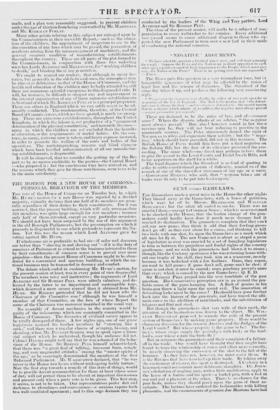" N EGAT1 1;: " A RGUM ENTS.
*1\-t have asked the question a hundred timas over, and patientir for a reply : Suppose the Preis and the :Vitt ut are in direct opposition to ratti other nmai a point esteemed of luilu importance to the People. %Odell must give way. the Nation or the Peers? Thete is no getting over that one argtialent."
ii in, The 'flocs puts this question in a very triumphant tone, but in o liunentable ignorance or what mar be effected by the union of legal lore and the science of dialectic's. The Shindard of the same day takes it up, and preduces the following very convincing reply.
" We get over the argument very shortly. by either of two road, open for us: in maxims if the law of England. Tim first is the maxim, that the defend-
;we,' ca,4 i.alwaYs thi..best '—nzalin* est rus,s the second maxim that in it dispute which admits of no arbiter, the negative must Away, prevail —seniper Juit'Slu fit iinr pl'(»Ierrf t ."
These are declared to be the rules of law, and of—common sense.' Where the dispute admits of no arbiter, " the negative must always prevail." But, alas ! however sound in law thee maxims may be, they will not bear reducing- to practice in the nineteenth century. The Poles strenuously denied the right of Nterroreas to whip and expatriate their nobility : but the " nega- tive," which should have prevailed, did not in this instance. 'Ile Blitish House of Peers would fain have put a thud negative on the Reform Bill, but the fear of its efficiency prevented the pro- ceeding. The same wholesome dread may perhaps induce them to eive the assent to the Local Courts and Irish Chtoch Bills, and to lay negatives on the shelf for a while. The legal dogmas which the Standard is so fond of quoting in order to settle constitutional points or difficulty, remind its of the remark of one of the shrewdest statesmen or any age or c .untry —Gouverneur AIouots ; who said, that " systems take.' out of books were it only to be put into books again."
















 Previous page
Previous page